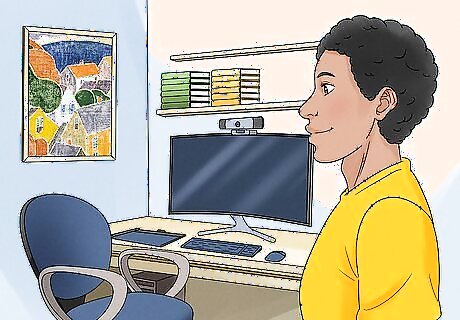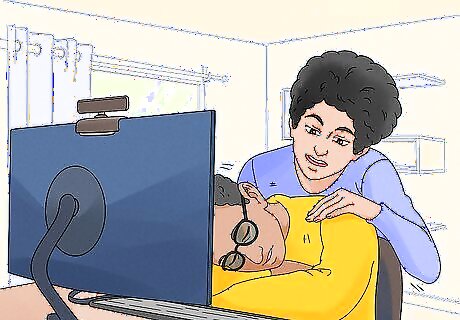
views
Ask questions.

Keep your brain engaged by talking to the teacher or your classmates. If you're confused about something, raise your hand and ask for clarification. If you have a comment to make, chat with the person next to you. It's tough to fall asleep in the middle of a conversation, so it's a great way to keep yourself awake. As the teacher speaks, take down notes and formulate questions about the material you're learning. If there's something you can't figure out, put up your hand and ask a question about it. When the teacher poses questions to the class, don’t be afraid to put up your hand and provide an answer. Some teachers will put you on the spot for a while because of any noticeable inattentiveness.
Stretch and move around in your chair.

Even a little bit of movement can keep you awake during class. Shuffle your feet, stretch your arms, and move your hands around to keep yourself awake without being disruptive. If your teacher allows it, you could even stand up and walk around for a minute or two. If you feel you're nodding off, sit up straight and stretch. Move your head from side to side to make your neck limber, and gently twist sideways from the waist to stretch your back. Kick your legs in front of your desk and stretch them out, and push your arms out in front of you to stretch them as well. Roll your feet in circles or trace the alphabet with your toe.
Fidget quietly while you listen.

Keep your body active to prevent sleepiness from taking over. Tap your feet on the floor, pump your legs up and down, tap your fingers on the desk, twiddle your thumbs, or hold your pen in your fingers and twirl it around. Stay quiet with your movements so you don’t distract any other students. If fidgeting helps you focus, consider bringing a fidget spinner to class with you. This small toy can give you something to do with your hands while you focus on paying attention in class. Bring squishy fidgets if it is allowed. These help get out your urge to squeeze.
Doodle on a blank page.

Drawing silly pictures and random notes can actually help you focus. As you sit and listen during class, grab a pen and let your hand draw whatever it wants. Don’t expect an artistic masterpiece—most doodles look like random scribbles on the page. Still try to pay attention to school activities. If you aren’t sure what to doodle, start with abstract shapes. After that, your brain will probably take over so you can keep drawing without thinking about it. Studies show that doodling can actually help improve your memory, too!
Chew minty gum.

Studies show it can actually help you focus on monotonous tasks. If you’re having trouble staying awake, pop a piece of mint gum in your mouth and let it refresh and energize you. If you aren’t allowed to chew gum in school, crunch a mint instead. Chewing gum can also help you study better. If you chew a piece of gum while studying and then chew a piece of the same flavor gum while taking the test, it can unlock your memories and help you remember the right answers.
Practice deep breathing.

It will raise the oxygen levels in your blood and make you more alert. Sit up straight and inhale deeply through your nose, pushing your belly outward. Breathe out through your mouth with your lips pursed, kind of like you’re whistling. Do this at least 10 times for a quick burst of energy. If you’re having trouble taking a deep breath, put your hand on your stomach to feel it rise as you breathe in and out.
Drink cold water.

Refresh yourself with a blast of ice water if you feel sleepy. Either keep a water bottle on your desk or head to the drinking fountain during break to wake yourself up. Plus, it will keep you hydrated! If you’re feeling super tired, consider heading to the bathroom and splashing your face with cold water.
Get active after school.

Burn off some energy so you can fall asleep later. Take a walk or run around the neighborhood, exercise, or head out for a quick snack once class is over. Staying away from screens and getting out after school will make it much easier to go to sleep at night and wake up in the morning. Do your best to not turn into a couch potato and stare at your phone once you’re done with class for the day. Jog for 15-30 minutes to get your energy out. If you can, try joining an after school sport or extracurricular that gets you outside for a little exercise.
Eat well throughout the day.

Healthy meals will boost your energy and keep you alert. Keep healthy snacks on hand so you can munch throughout the day, and make it a point to eat a good breakfast and dinner. Try to include fruits, vegetables, whole grains, and lean protein in everything you eat. Good snacks include plain crackers, crackers and cheese, vegetables, hummus, fruit, yogurt, nuts, seeds, and dried fruit.
Set up a dedicated workspace for remote learning.

Sitting at a desk can help wake you up and motivate you. Set up an office chair with a firm back in front of a desk or a dedicated workspace. Don’t sit in bed with your laptop while you’re in class—your mind and body associate your bed with sleep, and working there may trigger you to start snoozing. If you don’t have a personal desk or office, ask your parents if there’s a place in your home where you can have a dedicated work space. Having one area specifically set aside for school will help keep you productive and alert.
Keep your webcam on in online class.

It will let the teacher know that you’re awake and paying attention. If you’ve ever fallen asleep in the classroom, you may have had a teacher call you out. It was probably embarrassing, but it woke you up! Keeping your webcam on will let your teacher see your face. Not only will they wake you up if they see you snoozing, but you’ll be less likely to fall asleep knowing that they’re watching. If your teacher specifically requests that your class turns their camera off during breaks or independent work, follow their directions. These breaks are a good opportunity to get up and stretch or get a glass of ice water, which will also help to keep you up.
Protect your sleep cycle with blue light glasses.

Staring at a computer all day can really mess up your sleeping schedule. If you’re taking online classes, consider getting blue light glasses to protect your sleep cycle. Computer screens and phones emit blue light, which your brain interprets as a message to stay awake. Blue light glasses block this light, which should make it much easier to fall asleep at night after a long day of digital learning. You can buy a cheap pair of blue light glasses online for $10-20. Your parents will probably buy them for you if you tell them why you want them!
Ask a parent or sibling to hold you accountable.

Have them check in on you during online class to keep you awake. If they see you starting to doze off, ask them to wake you up. If your parents have to leave for work, ask them to wake you up before they leave. You could also ask a friend who’s in the same class to call you once class starts. Then, you can check in with each other periodically to make sure you’re both awake and paying attention.
Get enough sleep every night.

It can be tough, but it’s a great way to stay awake during the day. If you’re an older child or teenager, aim for getting at least 7-10 hours of sleep every night. If you’re younger than 10 years old, you might need closer to 9-11 hours of sleep every night. Being tired during the day means you're more likely to fall asleep in class, so try to avoid it as much as possible. If you find you don't have time to get enough sleep because you're working too much, talk to your boss about taking fewer shifts. If you have too much homework, talk to your teachers about making more time for schoolwork during class time. If you're spending too much time with friends, restrict your social engagements to the weekends.
Go to bed around the same time every night.

It will help you fall asleep and feel rested every night. The idea of having a bedtime may seem childish, but the routine can help you get a better night’s rest. Even on the weekends, try to go to bed around the same time to keep your sleep schedule intact. Depending on the person, sometimes waking up early can help improve sleep. If you are going to bed at the same time every night but still wake feeling tired, try moving your bed time ahead by an hour and see how the extra hour of sleep affects your daytime wakefulness.
















Comments
0 comment